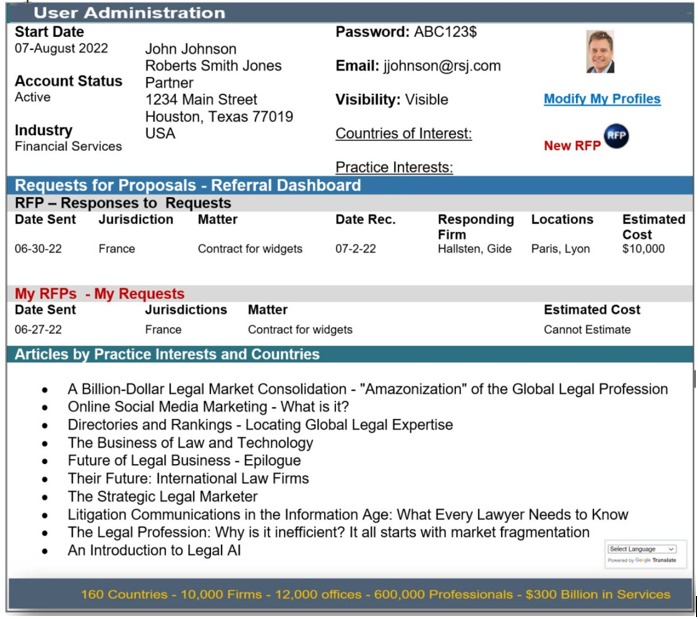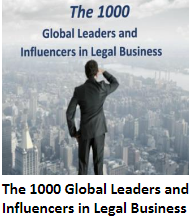Lucy Endel Bassli Founder and Principal, InnoLegal Services, PLLC
Lucy Endel Bassli is a legal industry expert, engaging in
thought-leadership projects to drive change and evolution in the delivery of
legal services. She is the founder of InnoLegal
Services PLLC, a modern solution provider that offers legal advice and
consults on operationalizing the practice of law. She works with law
departments and law firms on innovating their legal service delivery and
consumption models, and trains lawyers in innovative practices. She also serves
as deputy general counsel of legal operations, contracting, and corporate
G&A for Snowflake Computing. Lucy specializes in all things contracting:
resource allocation, automation, process optimization and smart risk-taking.
Lucy also is the Chief Legal Strategist for LawGeex, a cutting-edge AI legal
tech start-up automating contract review services.
In her 13 years at Microsoft, where she ran an enterprise contracting
solution, Lucy focused on complex and global outsourcing contracts and gained
firsthand experience in legal outsourcing to assist her with high-volume
contract transactions. She launched an innovative “managed services” engagement
with law firms and actively worked on continuously improving the value
received.
Prior to joining Microsoft, Lucy practiced law at Davis Wright Tremaine,
LLP in Seattle, WA, focusing on commercial transactions and commercial
bankruptcy. Lucy received her J.D and BA from the University of Houston in
Houston, Texas, where she grew up, but has been living in the Seattle area
since completing law school.
Lucy is a licensed member of the Washington and Texas state bar
associations, and was named to the National Law Journal list of Outstanding
Women Lawyers, 2015. She is a frequent speaker on topics of legal services
innovation, legal technology, and legal process outsourcing.
This article was originally published by the Legal Executive Institute on September 10, 2018 and is reproduced here in its entirety.
______________________________________________________________________
There has been a significant amount of well thought out articles in the legal press on the topic of the entry of “Big 4” accounting firms into legal services. Most recently, the announcement of EY’s acquisition of UK legal service firm Riverview. It is almost impossible to keep up with this whirlwind of change.
Clearly, the
Big 4 are entering the
legal space in the US as well as
globally; and there are many reasons for
this, all of which have been explored
thoroughly.
I’d like to
take a different approach for this article and provide some perspective from
personal experience. Setting aside the historical developments, changes in
regulatory restrictions outside of the US, and the disaggregation of legal
services, I’d like to focus on what it is that makes the Big 4 appealing to
commercial legal departments.
These firms
are many things to many people, including, but not limited to:
1. Experienced Consultants — The Big 4 have extensive
business and management consulting practices with arguably the best
professionals in the field. They provide a perspective into legal services
which will inherently be grounded in business and tend to offer solutions to
problems that contemplate the end business goals. They are experts in all kinds
of operations and will naturally focus on efficiency and practical application
of theory. Even if I would not have known to ask for this perspective, the Big
4 will always provide it. That kind of experience is priceless for the legal
experts buying these services, who may not know that they even need such
operational insights.
2. Process Engineers — With an expertise in
management consulting, these professionals will undoubtedly and inevitably
identify process improvements. After all, managing is all about aligning
resources and delivering outcomes, isn’t it? In legal, we desperately need to
rethink our allocation of resources. Much of what the industry is going through
today is about changing engagements with law firms, adding new professionals
into our mix, and outsourcing certain legal work. As challenging as that is for
legal professionals to consider and implement, it is very easy for management
consultants. Similarly, the focus on outcomes is never lost on management consultants,
yet is it often lost on lawyers. Too many lawyers think that the outcome is the
production of the legal advice, in whatever format. Helping lawyers focus on
outcomes is another priceless benefit the Big 4 bring to every engagement.
3. Project Managers — There is no more beautiful
deliverable than a piece of work product delivered by a professional project
manager. Beyond just the actual deliverable, all work and engagements run
smoother with a project manager involved. People are kept on track, timelines
are strict, and action items are carefully tracked. The Big 4 are very
comfortable with engaging project managers and make it a common practice on
many of their consulting engagements.
4. Established Trusted
Relationships —
The Big 4 know how to deal with big enterprises. They understand the
complexities and (well, let’s call it what it is) the politics of
working with a matrixed organization with unclear decision-making authority and
undefined processes. Beyond just understanding corporate culture, the Big 4
already have deep relationships with most large US and global companies. They
likely have very useful contacts within the organization that may prove quite
helpful when trying to accomplish a controversial goal or execute on an
unpopular plan. Often these “outsiders” have contacts within the client
organization at higher levels than those they are engaging with in the client
company on any one particular project. Sometimes those connections help get
projects over the finish line.
5. Proven Results — The demonstrated success in
tax law services has set a foundation for expansion into legal services that is
grounded in experience on very complicated legal principles. Surely, if the Big
4 can become experts in tax law, they can deliver just about any other legal
service!
6. Scale — The Big 4 have presence in
almost every country where there is business conducted by multi-nationals. They
can reach a scale that few other providers can compare with. They seem to have
connections to experts on every topic of interest to their corporate clients,
whether internally within their own employee base, or within an intricate and
powerful network of related entities and affiliates.
7. Quality and Reputation — There is an undeniable trust
that comes with the Big 4, which is why so many large corporations choose to
use them for broad ranges of services. That umbrella of trust seems to cover
all the work they do, even in areas that are new to these providers. There is
history of high quality, and there are widely accepted expectations of
continued quality work from the Big 4. There is little doubt or uncertainty in
their ability to deliver on their promises.
8. Technology — The Big 4 know how to invest
in technology. They have sizeable R&D departments and are comfortable
setting aside resources for the benefit of their future. They have been around
a long time and continue to evolve by keeping up with technology advances. They
are certainly interested in legal tech, and with their ability to scale and
investment resources, will have an easy time catching up to anything that is
leading the market, and likely become the industry leader themselves. Those are
baskets that many clients would be comfortable placing their eggs in!
9. Predicable Pricing — These are not low-cost service
providers, but neither are law firms. One thing the Big 4 has, however, is
predictability on pricing. Long gone are their days of pricing by the hour (at
least in the Big 4’s world), and instead fixed fees based on the project scope
are the norm. More importantly, the Big 4 are accustomed to helping clients
define the scope of work during the process and will adjust their pricing
accordingly.
10. Sheer Size and Locations — The Big 4 have what seems to
be an unlimited number of people located in the most remote corners of the
world. It feels like there is no place in the world where they don’t have a
presence and no end to the availability of people to put on the task. There is
nothing more frustrating than hearing from a service provider that they don’t
have the people available when you need them. The Big 4 always have people
available.
These are some
of the attributes that make me confident about the Big 4 expanding into legal
services. There is no question about their potential in this space, and it only
makes sense that the law firms and
“not-so-alternative
anymore” providers would be watching closely and
learning.
Indeed, as I reflect on this list, I
have to ask, why would a corporate legal department hire anyone else for
certain work that is not worthy of law firm rates and is more complex than what
the “not-so-alternative” provides deliver today?





 Software
Software Law
Law Legal
Legal






